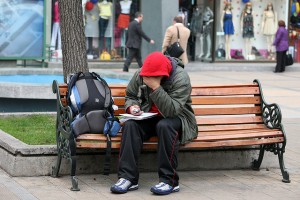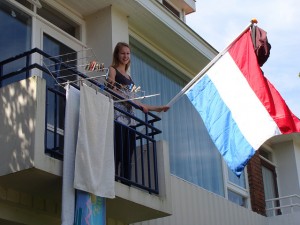parade [noun] [de parade, de parades] [‘paa-raa-du‘]
Examples:
– "De veteranen werden geëerd met een militaire parade."
("The veterans were honoured with a military parade.")
– "Ga jij ook naar De Parade deze week?")
("Are you also going to "De Parade" this week?" See ‘Extra’.)
Related words:
– "Optocht": march, parade.
– "Paraderen": to march, to parade.
– "Processie": procession.
– "Stoet": procession, parade.
– "Begrafenisstoet": funeral procession.
Extra:
"De Parade" is a Dutch cultural festival which is held during the summer season every year. "De Parade" is held successively in Rotterdam, Den Haag, Utrecht and Amsterdam. It offers a varying range of Dutch theatre, music, dance, film and special foods and drinks. The shows, often exclusively produced for "De Parade", vary from three to fourty minutes. Concept of "De Parade" is that an entrance fee (6 Euros) is paid to enter the Parade terrain, and then additional fees must be paid for individual shows (from 2 to 10 Euros). Every day from 15.00h there’s also the "Kinderparade", for children (no entrance fee).
Although most of the spoken shows are in Dutch, "De Parade" is highly recommended by the Dutch Gurus, since the atmosphere is really relaxed, ‘cultural’ and friendly (there are also music shows and shows where it is not about speech). Even without going to a show, one can eat and drink at "De Parade" while doing some nice people watching. Dutch Guru Tip: don’t leave "De Parade" without having paid a visit to the Silent Disco 🙂
"De Parade" in Den Haag is located at the Westbroek Park, from July 6th-15th.

 “Opruimen” usually involves putting away or reordering objects 🙂 Cleaning in the general sense is translated with the verb “schoonmaken” (“to make clean”).
“Opruimen” usually involves putting away or reordering objects 🙂 Cleaning in the general sense is translated with the verb “schoonmaken” (“to make clean”). Unlike its opposite “
Unlike its opposite “ This time of the year in the Netherlands, you often see houses where the Dutch flag is raised with a schoolbag attached to it. This indicates that the owner of the bag has passed his or her high/secondary school final exams. Sometimes you see the bag only, if they don’t have a flag.(Photo: evanstra (flickr.com) –
This time of the year in the Netherlands, you often see houses where the Dutch flag is raised with a schoolbag attached to it. This indicates that the owner of the bag has passed his or her high/secondary school final exams. Sometimes you see the bag only, if they don’t have a flag.(Photo: evanstra (flickr.com) – 